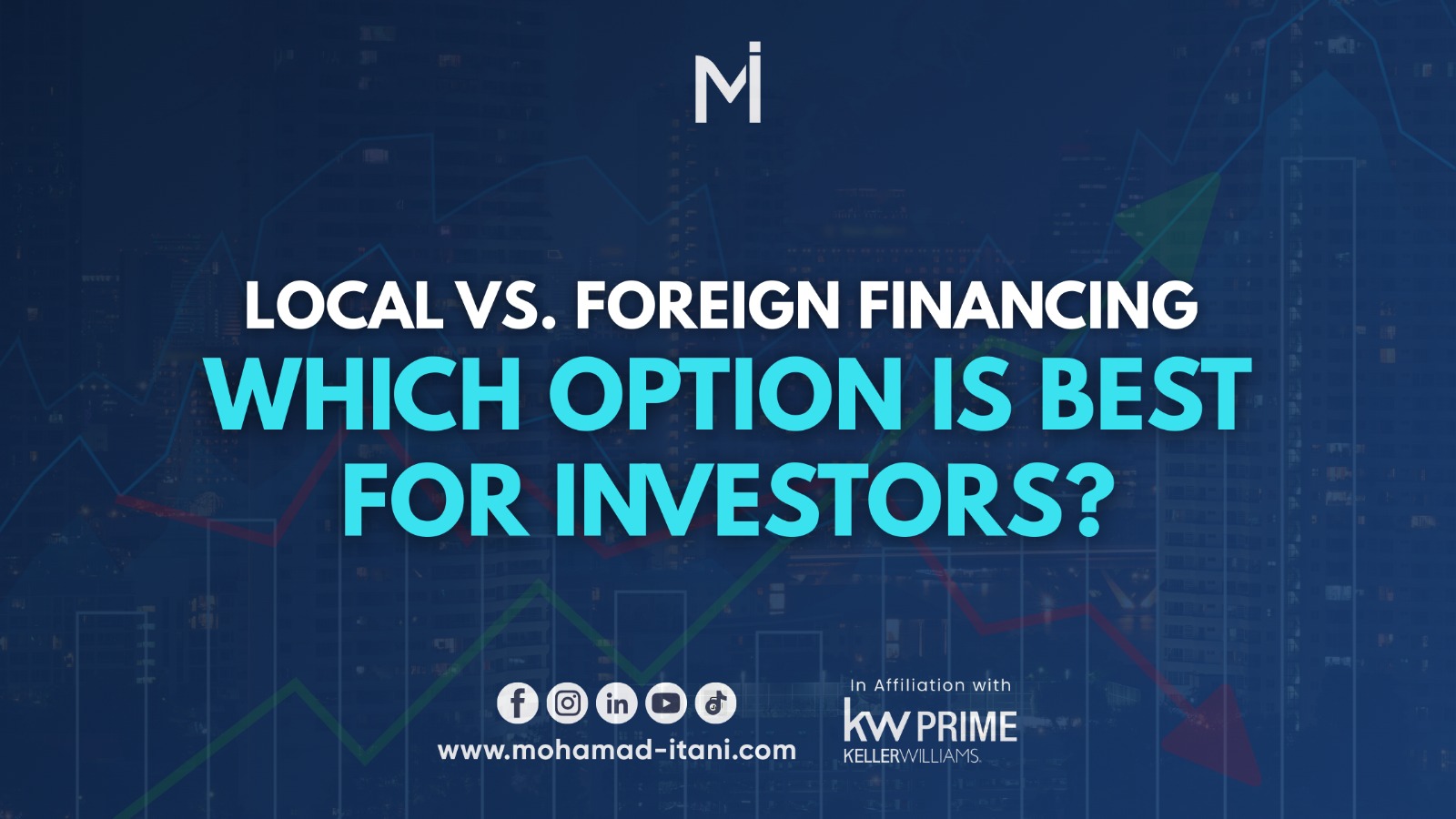Local vs. Foreign Financing: Which Option is Best for Investors in Saudi Arabia?
Investing in real estate in Saudi Arabia offers lucrative opportunities, but the financing aspect plays a huge role in determining your investment’s success. Whether you’re an international investor from the UK, GCC, or Malaysia, choosing the right financing option is crucial. Should you go with local financing through Saudi banks, or is foreign financing a better fit for your needs?
In this article, we’ll break down both local and foreign financing options available in Saudi Arabia, highlight the pros and cons of each, and help you figure out which one suits your investment strategy best.
Introduction to Real Estate Financing Options in Saudi Arabia
Why Understanding Tax Benefits is Crucial for Real Estate Investors
Choosing the right financing can make all the difference between a profitable and a struggling real estate investment. Whether you’re a local investor or an expat, understanding your financing options is essential. The way you finance your investment will affect your cash flow, ROI, and the overall success of your real estate venture.
Overview of Saudi Arabia’s Taxation System for Real Estate
In Saudi Arabia, financing options for real estate fall into two main categories: local financing from Saudi banks and foreign financing from international lenders. Both have their advantages and drawbacks, and the choice depends on various factors like interest rates, loan terms, and your status as an investor (local or foreign).
Key Considerations for Investors When Choosing Financing Options
When deciding which financing route to go down, keep these key factors in mind:
- Loan eligibility: Who qualifies for local loans and who needs to look into foreign financing?
- Interest rates: Understanding the difference between local and foreign financing rates.
- Repayment flexibility: Which financing method offers more flexibility for repayment terms?
- Access to financing for expats: Are expats eligible for local financing or should they opt for foreign lenders?
Local Financing Options for Real Estate Investment in Saudi Arabia
Local Bank Loans in Saudi Arabia: How They Work
For investors within Saudi Arabia, local bank loans are often the first choice. These loans are offered by Saudi banks and typically come with competitive interest rates, longer repayment terms, and easier approval processes.
- Interest Rates: Local banks tend to offer lower interest rates, making them more affordable for investors, especially when compared to foreign financing.
- Repayment Terms: With repayment terms typically ranging from 10 to 30 years, it’s easier for investors to manage their cash flow.
Pros and Cons of Local Financing for Investors
Pros:
- Lower Interest Rates: Local financing is more affordable for Saudi residents and investors, with rates generally ranging from 3-5%.
- Easier Approval Process: Saudi nationals and residents often face fewer requirements when applying for loans with local banks.
- Faster Processing: Local loans are typically processed more quickly compared to foreign financing options.
Cons:
- Stricter Eligibility for Expats: Expats might face higher interest rates or additional requirements to qualify for loans.
- Limited Loan-to-Value Ratio: Local banks might require a larger down payment (sometimes up to 30%) compared to foreign lenders.
Interest Rates and Loan Terms for Local Financing
Interest rates for local bank loans generally range from 3% to 5%. The repayment period can extend to 30 years, giving investors ample time to repay the loan. Local financing typically offers fixed-rate loans, making budgeting for repayments easier.
Foreign Financing Options for Real Estate Investment in Saudi Arabia
How Foreign Financing Works in Saudi Arabia
Foreign investors also have access to financing options through international banks or foreign lenders. While the process might be a bit more complicated for foreign investors, the benefits can be worth it for the right kind of investment.
- Eligibility: Foreign investors might face higher deposits or stricter eligibility requirements compared to local borrowers.
- Loan Types: Foreign financing typically involves mortgage loans or developer-financed projects, especially for large-scale real estate developments.
Advantages of Using Foreign Financing for Real Estate
Pros:
- Larger Loan Amounts: Foreign financing often offers higher loan amounts, which is ideal for investors looking to purchase high-value properties.
- More Flexible Loan Terms: Foreign lenders are more likely to offer flexible terms suited to global investors.
- Diversification of Financing: Using a foreign lender helps investors diversify their funding sources, which can reduce risk and improve opportunities for other investments.
Cons:
- Higher Interest Rates: Foreign financing generally comes with higher interest rates (typically around 6-8%).
- Longer Approval Times: The approval process for foreign loans can take longer, and it might require more documentation.
- Currency Exchange Risks: Currency fluctuations can affect the cost of borrowing for foreign investors, depending on their home country’s currency.
Potential Challenges of Foreign Financing for Saudi Property
Foreign financing can present certain challenges, such as:
- Longer processing times, which can delay property purchases.
- Higher fees, making it a more expensive option compared to local loans.
Local vs. Foreign Financing: Key Differences and Considerations
Key Differences in Interest Rates, Loan Terms, and Flexibility
- Interest Rates: Local financing typically offers lower rates (3-5%), while foreign financing can be 6-8% or higher.
- Loan Terms: Local loans usually come with longer terms (10-30 years), while foreign loans may have shorter repayment periods.
- Loan Amounts: Foreign financing often provides higher loan amounts, which is beneficial for larger projects.
Which Financing Option is More Accessible for Expats?
For expat investors, local financing might be harder to access, depending on their residency status. Foreign financing might be a more flexible option for expats, though they may face higher interest rates.
Risks of Local vs. Foreign Financing for Investors
- Local Financing: Lower interest rates, but expats may face additional barriers, and local loans may require larger down payments.
- Foreign Financing: Higher rates and longer approval times, but offers larger loans and greater flexibility for international investors.
Best Financing Option for Real Estate Investors in Saudi Arabia
Factors to Consider When Choosing Financing
The best option depends on several factors, such as:
- Loan eligibility: Local loans are often easier for Saudi residents, but foreign financing offers more flexibility for expats.
- Interest rates and loan terms: If you’re looking for lower interest rates, local loans are the better option.
- Loan amounts and repayment flexibility: If you need higher loan amounts, foreign financing might be the way to go.
Recommendations for Foreign and Local Investors
- For Local Investors: Local financing is the best option due to lower rates and easier approval.
- For Foreign Investors: Foreign financing is often necessary, but it’s important to compare lenders to find the best loan terms and rates.
Conclusion: The Right Financing Strategy for You
Choosing the right financing option ultimately depends on your specific needs and investment goals. Both local and foreign financing offer unique advantages, so take the time to assess your situation before making a decision.
Frequently Asked Questions (FAQs)
Q1. What is the best financing option for real estate investment in Saudi Arabia?
The best financing option depends on your citizenship and investment goals. Local financing is often better for residents, while foreign financing may be necessary for expats.
Q2. Can expats access local financing for real estate in Saudi Arabia?
Expats can access local financing, but they may face higher interest rates and stricter eligibility requirements.
Q3. What are the advantages of foreign financing in Saudi property investment?
Foreign financing offers higher loan amounts and more flexible terms but comes with higher interest rates.
Q4. How do interest rates differ between local and foreign financing in Saudi Arabia?
Local financing generally offers lower rates (3-5%), while foreign financing can have higher rates (6-8%).
Q5. What challenges might foreign investors face with financing in Saudi Arabia?
Foreign investors may face longer approval times, higher fees, and currency exchange risks.













